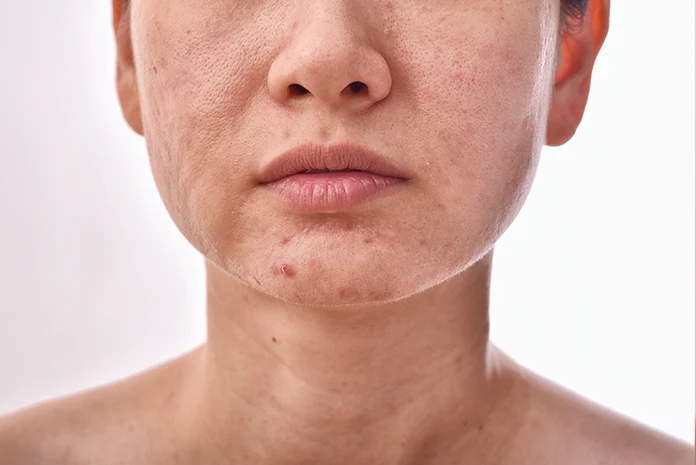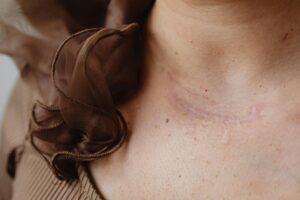If you have acne-prone skin, makeup can feel like both a savior and an enemy. On one hand, it gives you confidence and helps you face the world. On the other, the wrong formulas or application habits can make breakouts worse.
The truth is, you can wear makeup with acne — you just need to do it the right way.
Can You Wear Makeup If You Have Acne?
Yes, absolutely. Makeup doesn’t cause acne by itself. The real problems come from comedogenic ingredients, bacteria buildup, and improper cleansing.
If you use non-comedogenic (won’t clog pores) and fragrance-free products — and remove them properly at the end of the day — makeup can be perfectly safe for acne-prone skin.
Ingredients to Look For in Makeup
Some ingredients in makeup can actually support clearer, calmer skin:
-
Niacinamide: reduces redness and helps regulate oil.
-
Salicylic acid: gently exfoliates inside pores to prevent breakouts.
-
Zinc oxide: soothes irritation and provides natural sun protection.
-
Hyaluronic acid: hydrates skin without clogging pores.
-
Mineral pigments (titanium dioxide, iron oxides): ideal for sensitive skin and less likely to cause irritation.
These ingredients not only make your makeup safer for acne-prone skin but can help your skin look smoother over time.
Ingredients to Avoid
Steer clear of ingredients that clog pores or cause irritation, including:
-
Coconut oil and lanolin: highly comedogenic, especially in foundations.
-
Isopropyl myristate: known to trigger breakouts.
-
Fragrance and essential oils: can cause redness and sensitivity.
-
Alcohol-based formulas: dry out your skin, leading to rebound oiliness.
-
Heavy silicones: can trap bacteria and sweat under your makeup.
If you’re unsure, patch-test any new product before using it regularly.
Application Mistakes That Worsen Acne
Even the cleanest formulas can cause breakouts if you use the wrong tools or techniques.
-
Avoid cushion compacts and sponges. These traps of bacteria and oil are one of the worst offenders for acne-prone skin. The warm, damp cushion surface becomes a breeding ground for microbes that transfer back to your face every time you apply.
-
Use clean brushes or fingertips instead. If you buy cushion-style products, toss the applicator and use a sanitized brush or clean fingers.
-
Clean your brushes weekly with a gentle cleanser or baby shampoo.
-
Never share makeup tools. Bacteria and yeast transfer easily between users.
-
Don’t layer heavy foundation on pimples. It emphasizes texture and slows healing. Use a light concealer instead, applied gently with a clean brush.
Best Foundations for Acne-Prone Skin
When choosing foundation, texture matters as much as ingredients.
-
Lightweight liquids or mineral powders work best — they let your skin breathe.
-
Semi-matte or natural finishes help balance oil without over-drying.
-
Avoid thick, full-coverage formulas unless you’re filming or attending a special event.
Recommended Formulas
-
BareMinerals Original Loose Foundation – pure mineral pigments, breathable finish.
-
NARS Pure Radiant Tinted Moisturizer – hydrates while evening tone.
-
Clinique Anti-Blemish Solutions Foundation – infused with salicylic acid.
-
IT Cosmetics CC+ Nude Glow – lightweight, SPF 40, ideal for redness.
Choosing the Right Tone
-
For acne redness: pick neutral or yellow undertones to counter discoloration.
-
For dull or uneven skin: go for slightly warm tones that brighten the face.
-
Avoid overly dewy or shimmery formulas — they highlight texture and pores.
How to Safely Remove Makeup
Removing makeup correctly is just as important as applying it.
-
Start with micellar water or an oil-based cleanser to break down foundation and SPF.
-
Follow with a gentle foaming cleanser to remove residue completely.
-
Avoid makeup wipes. They leave film on the skin and can cause irritation.
-
Pat dry with a clean towel — don’t rub your skin.
-
Finish with a soothing moisturizer or hydrating serum.
Extra Tips for Makeup and Acne Prevention
-
Change pillowcases and towels at least twice a week.
-
Sanitize your phone screen daily.
-
Don’t apply touch-up powder throughout the day — it traps oil and bacteria.
-
Avoid wearing makeup during workouts or sleep.
-
Try to give your skin makeup-free days when possible.
These simple habits help your skin heal while letting you still enjoy makeup safely.
FAQs About Makeup and Acne
Is powder or liquid foundation better for acne-prone skin?
Mineral powder or lightweight liquids are best. Avoid thick, cushion-based formulas.
Can I use concealer on active breakouts?
Yes, but gently. Use a clean brush and avoid layering too much.
How often should I clean my brushes?
At least once a week — more often if you have active breakouts.
Can I wear makeup while treating acne with medication?
Yes, but choose gentle, fragrance-free products and double cleanse every night.





